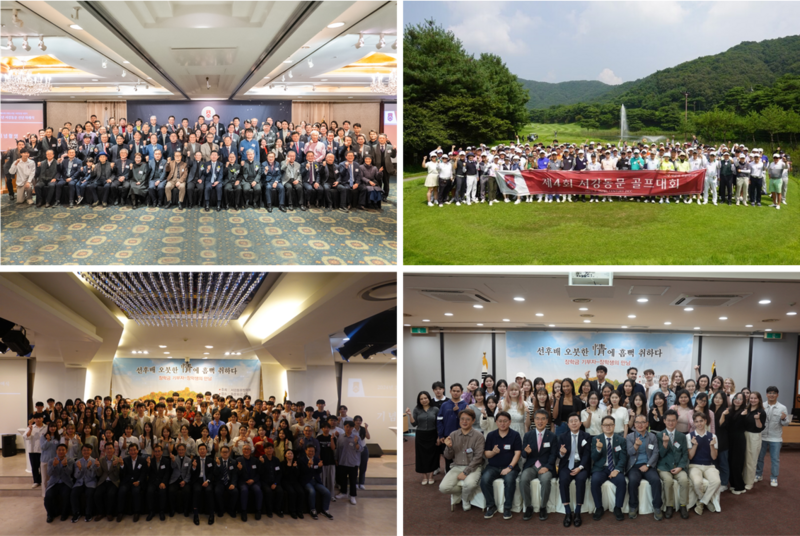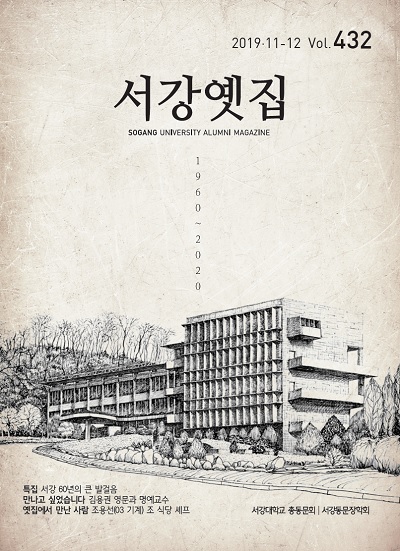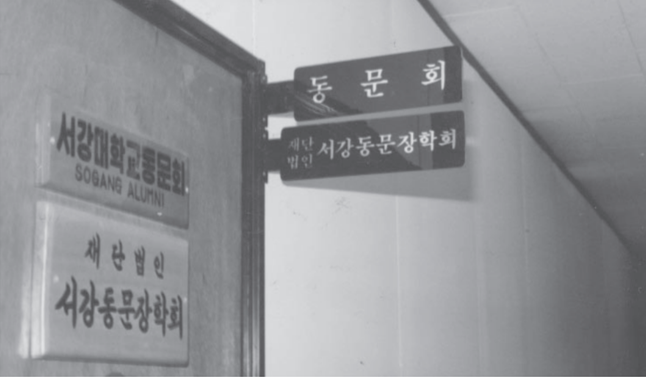"We're willing to invest for Sogang's future."-by Siyeon Kim…
페이지 정보
작성자 최고관리자 작성일24-10-13 00:28 조회1,409회 댓글0건첨부파일
-
 Were willing to invest for our future. -by Siyeon Kim Public Opinion Reporter, Sogang Herald.pdf
(179.9K)
9회 다운로드
DATE : 2024-10-13 00:28:11
Were willing to invest for our future. -by Siyeon Kim Public Opinion Reporter, Sogang Herald.pdf
(179.9K)
9회 다운로드
DATE : 2024-10-13 00:28:11
관련링크
본문
Public Eyes Vol.276
Siyeon Kim, Public Opinion reporter
09.21.2024
1678 Words
How Can Students Take Advantage of an Alumni Network
Many students today may not realize that they automatically qualify as alumni, regardless of their degree status; anyone who has attended a specific institution, even for a short time, is granted alumnus status. Almost all educational institutions offer alumni networks that can be leveraged in various ways, depending on the size and engagement of the network. Many alumni create networks to establish business connections or to form organizations that support students in achieving their future goals. What effective techniques and methods do students at Sogang University recommend for enhancing the alumni network? The Sogang Herald seeks to explore their thoughts on this important topic.
The Importance of an Alumni Network
Alumni networks play a crucial role in helping students achieve their future career aspirations, extending beyond just coursework support. Their purpose goes far beyond merely reconnecting with former classmates to reminisce; these networks can facilitate business partnerships, mentorship programs, and the exchange of valuable resources. In essence, an alumni network can serve as a dependable resource for collaboration. Most students are more than capable of sharing insights about their career journeys and the resources they require, drawing from their experiences in real-world settings. These former students can be invaluable assets, especially when launching organizations or mentoring programs designed to enhance employability. Both organizers and participating students can mutually benefit by promoting job opportunities to a wider audience, enabling students to gain practical experience in the process. Mentorship programs can act as a bridge between current students and recent graduates, guiding them in selecting career paths and imparting essential strategies for success.
Unilever, a multinational consumer goods manufacturer, exemplifies how effectively leveraging alumni network connections can lead to significant benefits. Paul Polman, a distinguished business leader and former CEO of Unilever, skillfully utilized the alumni network of London Business School in various capacities. Through his connections, Polman identified global trends, gaining insights into international business strategies and emerging markets. Engaging with alumni from diverse industries and regions equipped him to spearhead Unilever's international expansion and sustainability agenda.
By maintaining relationships with mentors, fellow graduates, and other business leaders, Polman accessed a valuable global network crucial for Unilever’s growth in emerging markets and its commitment to sustainability. Furthermore, alumni networks often foster collaboration and business partnerships. Polman’s involvement in international sustainability initiatives, such as the United Nations' Sustainable Development Goals (SDGs), suggests he leveraged his alumni connections and relationships with industry leaders to collaborate on projects that solidified Unilever's reputation as a leader in social responsibility.
How Did Sogang University Organize a Successful Alumni Network?
Setting a clear goal is one of the most crucial considerations before engaging in an alumni network connection. Without a defined direction, resources may be misallocated, and the network could lose its purpose. A clear objective helps individuals understand the relationships they are building and provides volunteers with a better grasp of their role in supporting the alumni network. When members work together toward a common goal, their cohesiveness strengthens. Additionally, establishing various indicators to evaluate the alumni network's progress toward its objectives is vital. This not only inspires all members but also creates opportunities for more people to join and contribute.
A prime example of a successful alumni network at Sogang University is the Sogang Alumni Scholarship Association. Established in 1986, this organization has been awarding scholarships to students who aspire to pursue their dreams despite financial difficulties. By encouraging contributions from alumni who are committed to serving society, the association aims to support future generations through various initiatives, including academic assistance, club funding, national exam preparation, mentoring programs, and community service. The Sogang Alumni Scholarship Foundation ensures that the scholarships donated by alumni are properly managed and utilized for the benefit of deserving students, providing essential encouragement throughout their academic journeys.
Q1. What do you think is the most important factor in forming and maintaining the alumni association?
The most important role of our alumni association is to serve as a bridge that connects alumni with the university and continues the legacy of Sogang. However, because our goal is often realized through events that focus on networking among alumni, some may view the alumni association merely as a social group aimed at strengthening connections. This is one of the misunderstandings we are actively working to resolve. Our aim is to create a "close connection between the university and its alumni."
Our alumni association seeks to expand the benefits available to alumni under the Sogang name. Ultimately, I believe the foundation for maintaining and revitalizing the alumni association lies in building strong trust and bonds between alumni, the association, and the university, with the most important factor being the linkage that carries on the Sogang legacy.
Q2. What are some programs or events offered by the alumni association?
The alumni association begins by asking, “What can we do for alumni in collaboration with the university?” As a first step, we often hold events designed to build networks among alumni, such as a New Year’s gathering, an alumni golf tournament, and a scholarship certificate award ceremony, where donor alumni can meet current students.

▲ 2024 Sogang Alumni New Year’s gathering, the 4th Sogang Alumni Golf Tournament, and scholarship certificate award ceremonies
Additionally, we organize both online and in-person alumni knowledge forums annually, providing an "Introduction to Sogang Studies." We also host various events that welcome alumni from different backgrounds, including inviting leaders of alumni groups and conducting regular video conferences with overseas alumni associations. Looking ahead, we are considering mentorship events to facilitate senior-junior networking. To promote these initiatives, we publish a monthly newsletter called Sogang Old House, which is sent to alumni. This newsletter shares updates about the university along with the vision of both the alumni association and the university.

▲ Sogang's Old House Vol. 432. Sogang's Old House changed its form from an off-line magazine to an online webzine, starting in Vol.433.
Q3. The alumni association operates a scholarship program through the Sogang Alumni Scholarship Foundation. What is the key task required to effectively maintain and implement this scholarship program?
The Sogang Alumni Scholarship Foundation offers two types of scholarships:
1 Tuition Deduction Scholarships: These scholarships partially or fully cover tuition fees. The deduction is applied directly to the tuition bill, which students can check right before the semester starts, and the funds can only be used for tuition.
2 Book and Living Expense Scholarships: These scholarships cover textbook costs and living expenses, allowing students to use the funds for any purpose they choose.
The scholarship funds have been collected since 1964, the year the first graduates (class of 1960) completed their studies. An official scholarship foundation was established in 1986, marking the beginning of systematic operations. Thanks to the tradition of giving back from senior alumni to junior students, the association continues to thrive today. Its role is to ensure that this practice can be passed down to future generations through the scholarship program.

▲ The first office of the Sogang Alumni Scholarship Foundation was located at the Room 301 in the Administration building.
To achieve this, the foundation’s staff and senior donors meticulously review students’ self-introductions, which include their scholarship plans and vision. Interviews with students are conducted when necessary. Additionally, we consider students who were not selected as scholarship recipients to explore further support possibilities. Our ultimate goal is to provide funds to as many students in need as possible.
Q4. I understand that alumni can donate not only to the scholarship foundation but also to the alumni association itself. What strategies are used to encourage alumni donations?
Currently, the Sogang Alumni Scholarship Foundation manages around 60 named scholarships. The foundation identifies students who meet the criteria set by each donor and incorporates their opinions during the final selection of scholarship recipients. We also ensure that students express their gratitude to the donor alumni, which encourages them to share the news with their peers, leading to more donations and the continued success of the program. Additionally, the foundation runs various fundraising campaigns, including upcycling initiatives to address social issues and promoting scholarship donations through the monthly Sogang Old House newsletter.
On the alumni association side, we host heartfelt events and expand various benefits for donor alumni. For instance, we send gifts to alumni who have donated ahead of the Lunar New Year and Chuseok holidays. We also provide access to campus facilities, health check-ups at medical institutions, and discounted rates at retail businesses. And, We are now in talks to allow alumni to use high-end accommodation facilities at discounted prices.
Q5. Have there been any unforeseen challenges in operating the scholarship foundation?
The first challenge is the instability in securing alumni scholarship funds. We have observed that alumni donations are often closely tied to economic conditions. For example, during the COVID-19 pandemic, donations dropped significantly, and in same year, we barely met 70% of our annual fundraising target. Fortunately, rising interest rates have paradoxically increased our financial income, enabling us to expand scholarship opportunities.
The second challenge lies in the differing perceptions regarding the use of scholarships between donor alumni and current student recipients, largely due to a generational gap within the alumni scholarship system. Many donor alumni are understandably less favorable toward textbook and living expense scholarships compared to tuition deduction scholarships.
Since 2010, several scholarships have made tuition more manageable, and the means-tested student aid system has expanded opportunities for students from lower-income backgrounds. Consequently, the foundation has shifted its focus to expanding textbook and living expense scholarships rather than tuition scholarships. However, this change has occurred over the past three years, and we recognize that some donors find it challenging to accept this sudden shift. Our goal is to effectively communicate the evolving scholarship needs of current students to alumni donors and to find solutions that accommodate everyone's perspectives.
As part of the broader mission of the alumni association, the Sogang Alumni Scholarship Foundation will continue to work tirelessly to foster harmony among alumni of different generations, all under the name of Sogang.
What Matters in the End
Students are empowered to strategize how to utilize alumni network systems that align with their specific needs, such as accessing resources or mentorship opportunities. Understanding the intricacies of the alumni network is a crucial first step, particularly for those beginning to shape their career paths to achieve their goals.
by Siyeon Kim (Public Opinion Reporter)
siyeon126@sogang.ac.kr
댓글목록
등록된 댓글이 없습니다.



